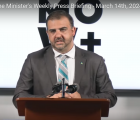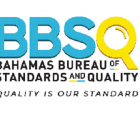Nassau, Bahamas (By Elcott Coleby) – The House met on Wednesday of this week (20th Jan 2016) to debate two borrowing resolutions under section 3.1 ‘LOANS’ of the Inter-American Development Bank Act (IDB Act). One was a $33 million loan to fund “a program of public financial management and performance monitoring reform” according to the bill’s sponsor, the State Minister for Finance the Hon. Michael Halkitis.
The second resolution was a $20 million loan to fund an anti-crime and social intervention program called the Citizens Security Initiative. This initiative will lead to the establishment of a parole system for the orderly and managed reintegration of ex-convicts into society.
Both resolutions will be debated separately instead of as a compendium.
Minister Halkitis pointed out that the loan was not for budget support but for program development. In this instance the first government program being debated was called “Management for results.”
The highlights and background of the resolution are as follow: The IDB approved an application for technical cooperation filed by The Bahamas government in June of 2010. A more efficient public administration was the government’s broad objective. Subsequent to that a grant of $1.6 million was secured by the Bahamas government to study the entire financial landscape of the government. “The overall objective of the program was to introduce the principle of management for results in the various stages of public sector management and administration in The Bahamas” said Halkitis.
The seven components of the financial assessment were as follow:
- Strategic planning: converting government priorities into plans.
- Budget by results: results oriented allocation of resources – not just to heads.
- Public financial management
- Project management
- Monitoring and evaluation of public administration
- Public procurement
- Audit
At the conclusion of the assessment, the consultants engaged delivered a report called the “Public Expenditure and Financial Accountability Assessment (PEFAA).” This was March 2012. With the exception of ‘budget versus outturn’ (where the government scored an ‘A’), the government scored a ‘D’ in most of the fiscal areas assessed; the government accepted the report. So in a nutshell, urgent action was needed to address institutional weaknesses and operational inefficiencies in public administration that could lead to public waste.
With this resolution the government of The Bahamas has taken a quantum leap forward in reforming the public service, thereby saving tax payers millions of dollars and significantly improving on the delivery of public goods and services.
- The four components of the program loan and itemized direct costs are as follow:
- Performance monitoring: strengthening management capacity ($3.1 million allocated).
- Strengthening the capacity of the Department of Statistics ($3.0 million allocated).
- Strengthening the Public Financial Management regime ($18 million allocated)
- Upgrade of the Public Procurement System ($6 million allocated)
As for indirect costs, $1.2 million are allocated to project management; $180,000 for evaluation and $1.3 million in contingencies for a total program cost of $33 million.
As for the features of the loan, it will be disbursed over five years and repayment begins six months after the last disbursement or in five and one half years from now or July 2021. The loan will be amortized over 25 years with biannual payments. The loan’s interest rate is a floating one – three months LIBOR plus 150 bases points which works out to 1.77%.
In other Parliamentary news, Central and South Eleuthera member the Hon. Damian Gomez notified the House that the Committee on Privilege will report on their findings stemming from claims of bribery made by Stellar Waste to Energy CEO Dr. Fabrizio Zanaboni by April Fool’s Day. In December 2015, Dr. Zanaboni revealed in an interview that both PLP and FNM members of Parliament asked him for “small” donations before the 2012 general elections. Mr. Grant characterized those claims as bribery and requested a House investigation. To date the committee has not been able to interview Dr. Zanaboni.





